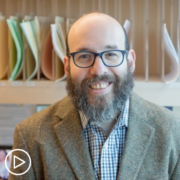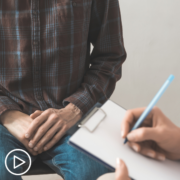Prostate Cancer Clinical Trials | Is Mistrust a Barrier?
Prostate Cancer Clinical Trials | Is Mistrust a Barrier? from Patient Empowerment Network on Vimeo.
Is medical mistrust a barrier to prostate cancer clinical trials participation? Expert Dr. Yaw Nyame with the University of Washington discusses the history of medical abuse with some people of color and how medical professionals must guard against excluding some patients from clinical trials.
See More from [ACT]IVATED Prostate Cancer
Related Resources:

|

What Impact Does Advanced Prostate Cancer Have on Lifestyle? |

Advanced Prostate Cancer Diagnosis and Survival | Black and Latinx Disparities |
Transcript:
Lisa Hatfield:
My question about barriers is about the historical mistrust of trials. Do you find that fear and mistrust is a barrier? Have you experienced that at all in your practice?
Dr. Yaw Nyame:
There is no doubt that we have a history of medical and clinical abuse of vulnerable populations. We oftentimes point to examples like Tuskegee as an example of medical abuse. But medical abuse and medicine started in the slave chattels, and we have it, we have documented and published examples of Black slaves in the U.S. being the subjects of medical experimentation that’s carried out into, you know, the early forms of formal medical education where patients who showed up to county hospitals and public hospitals were subject to experimentation that no doubt has a deep rooted effect on populations of color who seek clinical care from academic institutions. However, we can’t let that history be an excuse for excluding Black and Brown populations from clinical trials. And what happens now is oftentimes I hear, well, these folks are, don’t trust us.
And so what can we do to build the trust? Well, in that process, we oftentimes fail to just ask people whether or not they want to participate in trials. There’s this presumption that while people aren’t interested, and I think what we need to do is ask everybody that comes through our doors to consider a clinical trial and to think about what barriers truly exist to prevent people from participating. because right now, if we really rely on this mistrust and distrust as a viewpoint of why people aren’t participating in trial, then we actually, we put the blame on our patients, right? And we don’t actually put the blame on ourselves as the main drivers of non-participation or what really it’s not a participation issue. It’s an exclusionist issue, right? We propagate a history of excluding you know, people of color from clinical trials.




![[ACT]IVATED Prostate Cancer Specialist Treatment Centers (North America) [ACT]IVATED Specialist Treatment Centers (North America)](https://powerfulpatients.org/wp-content/uploads/ACTIVATED-Prostate-Cancer-Specialist-Treatment-Centers-North-America-180x180.png)





